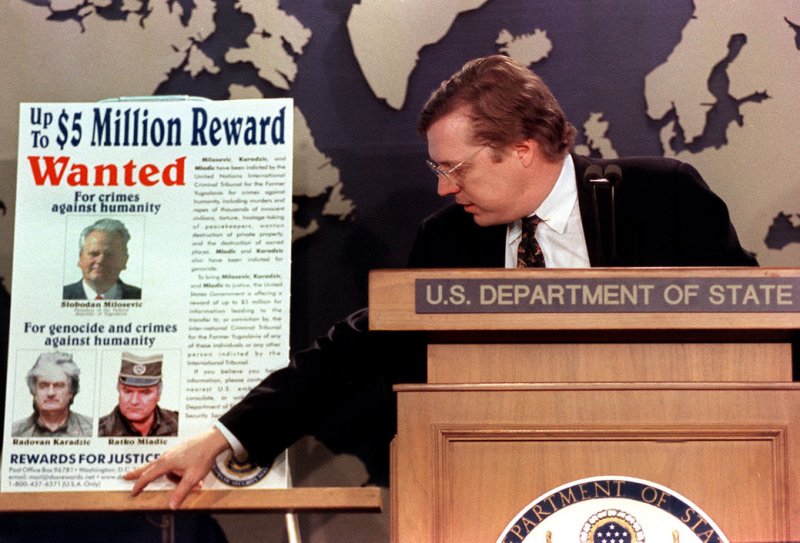WAP2000030251 - 02 MARCH 2000 - WASHINGTON, D.C, USA: David Scheffer, U.S. ambassador-at-large for war crimes, unveils a poster at the State Department, March 2, that will be distributed in Europe in an effort to step up the drive for the conviction of Yugoslav President Slobodan Milosevic and two other suspected war criminals. The State Department is offering up to $5 million dollars for information leading to the conviction of Milosevic, and two suspect Serbs, Radovan Karadzic and Ratko Mladic. rg/rg/Rachel Griffith UPI |
License Photo
BELGRADE, Serbia, June 3 (UPI) -- The arrest of war crimes suspect Ratko Mladic by Serbian officials proves the country wants to improve its international reputation, President Boris Tadic said.
"During the past 16 years we did not have the same governments in power, in the meantime there was a democratic revolution in Serbia, and 16 years ago Slobodan Milosevic was in power," the Serbian president told Euronews.net in an interview published Friday.
Mladic was indicted in 1995 by the U.N. International Criminal Tribunal for the Former Yugoslavia for genocide, war crimes and crimes against humanity. He is accused of being responsible for ethnic cleansing in Bosnia from 1992 to 1995, including the siege of Sarajevo, the Srebrenica massacre and the hostage-taking of U.N. personnel. The Srebrenica massacre was the largest mass murder in Europe since the Danube Swabians concentration camps of World War II.
The former Serbian general, captured last week after spending 16 years on the run, did not enter a plea Friday when he appeared before the tribunal, sitting at The Hague, Netherlands.
Mladic moved freely for years, making it "crystal clear" he was protected by the authorities who were in power then, Tadic said.
"This investigation was extremely painful for Serbia, the moral price in the international community was extremely high and we lost many investors in the past few years," Tadic said.
Milosevic also was charged with crimes against humanity by the International Criminal Tribunal for the Former Yugoslavia, but the trial ended after Milosevic died in his cell.















